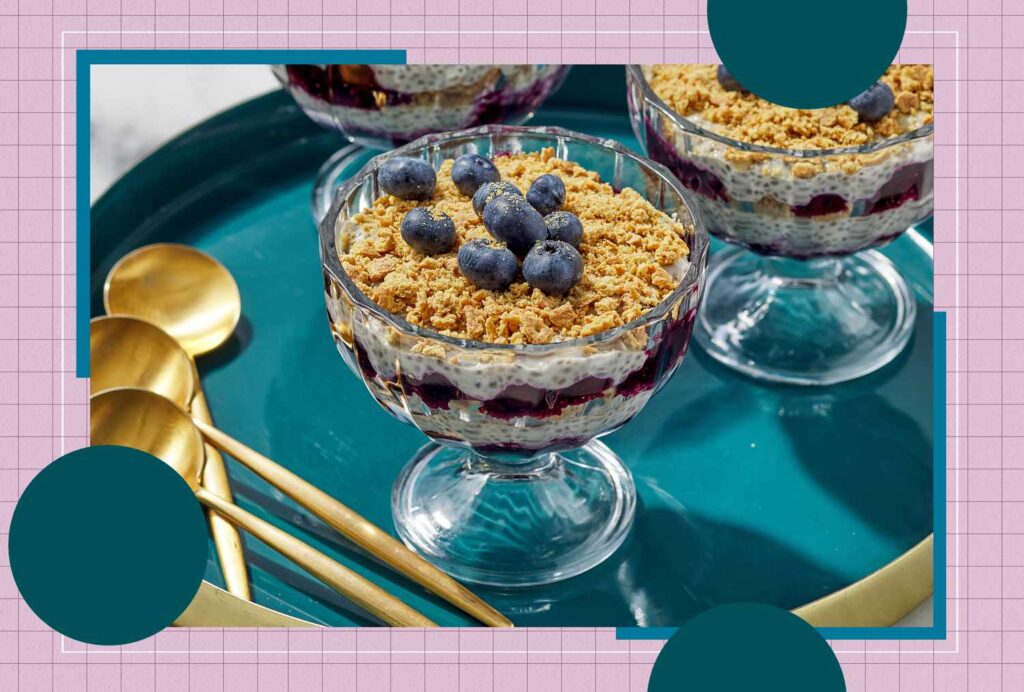- A fiber-rich dessert like a flavored chia pudding can ease constipation and support gut regularity.
- Chia seeds provide soluble and insoluble fiber plus prebiotics that nourish gut bacteria.
- Eating fiber after dinner gives your body time to work overnight and promotes morning regularity.
If you’re struggling with constipation, fiber is likely top of mind. While adding more fiber-rich foods to your meals is a smart move, dessert can be another chance to boost your intake. There’s nothing wrong with enjoying cookies or ice cream, but if your gut feels sluggish, the right sweet ending can actually support regularity.
Our top pick: Lemon-Blueberry Cheesecake Chia Pudding. This high-fiber dessert is delicious, satisfying and packed with nutrients that promote gut health—making it a tasty way to help you reach your 28 to 34 grams of daily fiber and wake up ready for a healthy bathroom trip.
Why This Dessert Works
This simple dessert has an impressive 8 grams of fiber, or more than one-quarter of your daily fiber needs. Most of that fiber comes from chia seeds. These tiny seeds are rich in both insoluble and soluble fibers. Most notably, chia seeds contain mucilage, a type of soluble fiber that gives the seeds their gel-like consistency when soaked in water. When you’re feeling backed up, eating foods like chia seeds that offer both types of fiber (soluble and insoluble) is particularly effective since it helps hydrate and bulk up stools for more comfortable poops.
Chia seeds also contain prebiotic fibers that help feed the beneficial bacteria living in your gut and increase the diversity of good gut microbes. Researchers have found lower levels of certain beneficial bacteria (like Bifidobacterium and Lactobacillus) in those who struggle with constipation. You can support a healthier (and more diverse) microbiome by snacking on chia pudding for dessert.
Extra Health Benefits
Blueberries and chia seeds are both packed with anti-inflammatory compounds (and constipation is often linked with chronic inflammation). Chia seeds are rich in omega-3 fatty acids–specifically alpha-linolenic acid–which research suggests offers anti-inflammatory benefits.
In addition, plant foods like blueberries and chia seeds contain polyphenols, a group of compounds linked with potential health benefits. Polyphenols support a healthier gut by promoting the production of SCFAs, which help reduce inflammation and increase diversity of beneficial bacteria in the gut.
Choosing Desserts That Help Keep You Regular
It probably comes as no surprise that fiber is the key nutrient to look for in a dessert if you want a B.M. in the A.M. Fiber tackles constipation by adding bulk to stool so it moves through the GI tract more easily, while also softening it to make going easier. For the biggest benefit, choose desserts with at least 3 grams of fiber per serving—think oats, chia or fruit—and pair them with a glass of water to help fiber do its job.
A healthy gut microbiome is another key factor for avoiding constipation. You can keep the beneficial bacteria in your gut happy by supplying them with food known as prebiotics. As the microbes in your gut ferment the prebiotic fiber in food, they release byproducts like short-chain fatty acids (SCFAs). These SCFAs are anti-inflammatory, supporting not only a healthier gut but your overall health. Luckily, there are a variety of prebiotic-rich foods that are commonly incorporated into desserts like fruit, nuts and whole grains.
Finally, timing can play a role. While there’s no single “best” time of day to poop, many people find mornings are the easiest. Overnight, your digestive system slows, allowing fiber from your evening meal or dessert to bulk and soften stool. By morning, your colon is more active, making it a natural window for regularity. Choosing a fiber-rich dessert after dinner can help set you up for success the next day.
Our Expert Take
If you’re constipated, but love a little treat after dinner, consider making a batch of this Lemon-Blueberry Cheesecake Chia Pudding. Chia seeds are a favorite constipation-fighting food since they are loaded with fiber and anti-inflammatory omega-3 fatty acids. For this dessert, we blitzed them together in a food processor with cream cheese, maple syrup and milk for an extra creamy cheesecake-flavored pudding that is layered with blueberries and graham crackers. Paired with a fiber-rich dinner and a tall glass of water, this dessert will go a long way to supporting a healthy bathroom trip when you wake up.
EatingWell.com, July 2024

